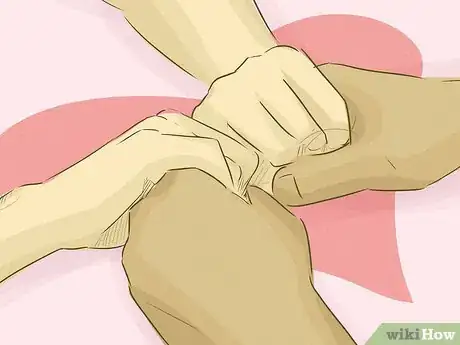This article was co-authored by Klare Heston, LCSW. Klare Heston is a Licensed Independent Clinical Social Worker based in Cleveland, Ohio. With experience in academic counseling and clinical supervision, Klare received her Master of Social Work from the Virginia Commonwealth University in 1983. She also holds a 2-Year Post-Graduate Certificate from the Gestalt Institute of Cleveland, as well as certification in Family Therapy, Supervision, Mediation, and Trauma Recovery and Treatment (EMDR).
There are 13 references cited in this article, which can be found at the bottom of the page.
This article has been viewed 40,590 times.
Feeling self-righteous all the time makes it harder to understand other people, make friends, and resolve relationship problems. Luckily, if you’ve realized that you’re too self-righteous, you’ve already taken the first step towards fixing the problem. You can adjust your attitude by forming deeper connections with other people, avoiding biased thoughts, and staying humble about your own viewpoints.
Things You Should Know
- If you catch yourself feeling self-righteous—or if someone accuses you of it—take some time to stop and look at the world through the eyes of the people around you.
- To put yourself in someone else's shoes, get to know them and their stories, and really listen to what they have to say.
- Learn to question what biases and stereotypes have shaped your thinking, and think about why you judge people and how you can meet them in the middle.
- Being assertive doesn't mean you have to put others down, so practice being humble and kind, even when you speak up for yourself.
Steps
Connecting with Others
-
1Look at the world through other people’s eyes. When you find yourself looking down on someone, think about what their life is like. Ask yourself how they might be feeling or what they might need right now. Try to imagine how their circumstances have shaped their philosophy about life.[1]
- For instance, someone who’s always lived in a big city may not see the world the same way someone from a small town does.
-
2Get to know people. Instead of judging strangers or assuming you won’t like them, reach out and say hello. Introduce yourself to neighbors, coworkers, or classmates from different backgrounds. Be friendly and curious, and you’ll have an easier time understanding why people act and think the way they do.[2]Advertisement
-
3Listen attentively to others. When you’re having a conversation, focus on understanding the other person. Pay attention to their body language, tone of voice, and emotions, as well as their words. Don't judge while you are listening. Do your best to see where they are coming from, even if you don’t agree.[3]
- Show the other person you’re paying attention to them by nodding at appropriate times and saying things like “Then what happened?” or “Mm-hmm.”
-
4Focus on common ground. If you dwell on all the ways someone is different from you, you might end up feeling like you’re better than them. Instead, try to find ways you’re alike. When you feel like someone is “on your team,” even in a small way, you’re less likely to feel self-righteous towards them.[4]
- For instance, maybe you and a new acquaintance can connect over your mutual love of mystery novels, or maybe you both came from large families.
-
5Forgive someone if they've hurt you. If someone has hurt you, make the choice to forgive them instead of carrying around a self-righteous grudge. Bitterness and resentment only hurt you, not the person who wronged you. Try to see the situation from their point-of-view and think about how you might have handled it.[5]
- Consider whether the person really meant to hurt you, or whether they were just acting in an inconsiderate or shortsighted way.
Thinking without Bias
-
1Ask yourself why you judge other people. Think about which circumstances and emotions trigger feelings of self-righteousness in you. This can be a tough question to answer, so be honest with yourself. Often, people are judgmental when they’re feeling insecure or inferior about themselves.[6]
- For instance, you might judge others for having a negative trait that you possess and dislike in yourself, even if you’re not consciously aware of it.
- You might also judge others when you’re feeling envious of them for some reason.
- If you are judging someone because they have hurt or upset you, you may want to find a healthier way to deal with your feelings. Try talking to the person about the situation.
-
2Learn to see the middle ground of situations. It’s all too easy to feel self-righteous when you see the world in black-and-white terms, but very few things in the world are all good or all bad. Get comfortable with the idea that your own way of thinking probably has some flaws, and different ways of thinking probably have some good points.[7]
- Talking to lots of different people is one good way to adopt a more flexible mindset.
- You can also practice debating with yourself. Think of an idea you support, like “Cats make better pets than dogs.” Then come up with some reasons people might disagree with you, like “Dogs are better pets for people who spend a lot of time outdoors.”
-
3Avoid stereotyping people. Don’t overgeneralize about other people, or you might end up writing them off for no good reason. Get to know them as individuals instead. You might be surprised at how much variation there is between people, even within the same groups.[8]
- For instance, if your workplace has just hired a new boss, don’t think, “She’s a manager – she must be uptight.” Wait and see what she’s like in person.
-
4Ask yourself if your judgments are based on fact or emotion. When you feel strongly about something, take a second to fact-check it. Emotion is important, but if you don’t temper your feelings with facts, you might have some distorted thinking patterns. Knee-jerk judgments and thinking the worst are a couple examples of overly-emotional thinking.[9]
- For instance, if your friend forgets your birthday and you think, “She doesn’t care about me. This is the end of our friendship,” you’re thinking the worst.
- If you are feeling emotional, upset, or angry, try talking to a close friend. They may be able to provide a rational perspective while helping you process your emotions.
-
5Stop thinking in terms of what you “should” do. Do you have clear-cut ideas about how you and other people should behave? “Should” is a subjective word, and having a long list of “shoulds” and “shouldn’ts” can make you feel self-righteous when other people don’t live the way you think they ought to. Replace “should” in your vocabulary with other words, like “could” or “want to.”[10]
- For instance, instead of telling yourself “I should eat vegetables tonight,” tell yourself, “I could eat vegetables tonight.”
- Or, instead of thinking, “Other people should do it this way,” adjust your thinking to, “Other people don’t do it this way. I wonder if I can find out why.”
Practicing Humility
-
1Assert yourself without putting others down. When you get into a discussion or argument, stand up for yourself, but don’t try to tear other ideas down in the process. You don’t have to “win” every time you disagree with someone. Hear the other person out, and then politely explain why you disagree with them.[11]
- Say something like, “I see where you’re coming from, but I still see it this way because…”
- A lot of minor disagreements aren’t worth getting worked up about. Save your energy by agreeing to disagree.
-
2Accept that people do things differently. There’s no right way to accomplish most things in life, so don’t expect people to do things exactly like you. If your method works for you, and their method works for them, neither of you is wrong or better than the other.
- For instance, it doesn’t really matter if you and your spouse clean the kitchen differently, as long as the end result is a clean kitchen.
-
3Realize you’re probably not as superior as you think you are. Most people overestimate their own abilities and talents. This can lead to feeling like you’re better than other people, even though it’s just an illusion much of the time. Be aware of your biases, and be honest with yourself about your bad qualities as well as your good ones.[12]
-
4Stop trying to change other people. Self-righteous people often try to bring others around to their way of thinking, but this won’t work. No one should feel pressured to give up their own ideas and quirks for the sake of fitting somebody else’s preferences. Live out your ideals proudly yourself, and accept other people the way they are.[13]
- For instance, if you’re passionate about the environment and your family isn’t, don’t nag them to become more like you. Instead, focus on what you can do yourself, such as volunteering for community clean-ups.
References
- ↑ http://time.com/3562863/5-ways-to-be-more-empathetic/
- ↑ https://greatergood.berkeley.edu/article/item/six_habits_of_highly_empathic_people1
- ↑ https://psychcentral.com/lib/become-a-better-listener-active-listening/
- ↑ https://www.psychologytoday.com/blog/what-would-aristotle-do/201505/how-be-empathetic
- ↑ https://www.psychologytoday.com/blog/evolution-the-self/201501/don-t-let-your-anger-mature-bitterness
- ↑ https://tinybuddha.com/blog/3-causes-for-judging-people-how-to-accept-yourself/
- ↑ https://psychcentral.com/blog/archives/2015/08/12/5-ways-to-expand-all-or-nothing-thinking/
- ↑ http://www.huffingtonpost.com/nozomi-morgan/how-to-avoid-making-assum_b_8196076.html
- ↑ https://www.psychologytoday.com/blog/in-the-face-adversity/201112/more-faulty-thinking-traps
- ↑ http://www.huffingtonpost.com/roya-r-rad-ma-psyd/self-righteousness_b_870825.html
- ↑ https://www.psychologytoday.com/blog/evolution-the-self/201209/how-and-how-not-stand-yourself
- ↑ http://io9.gizmodo.com/why-you-think-youre-better-than-everyone-else-1479390165
- ↑ https://tinybuddha.com/quotes/tiny-wisdom-when-other-people-wont-change/



-Step-8-Version-3.webp)


-Step-20-Version-3.webp)











-Step-10-Version-3.webp)






















































